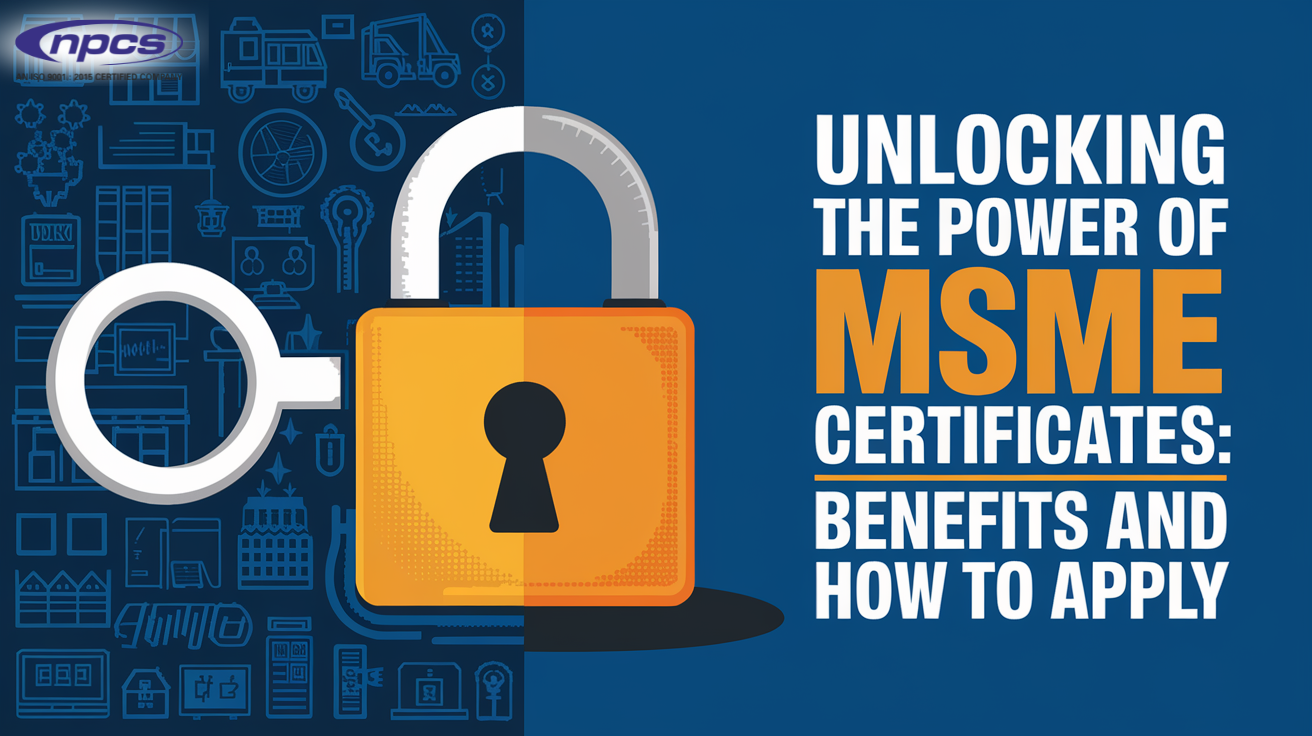Micro, small, and medium enterprises (MSMEs) are the lifeblood of India’s economy, facilitating innovation and employment generation. The MSME certificate is an enabling document under which any business is classified under that category and is entitled to various benefits such as financial assistance, tax concessions, and simple compliance mechanisms. Whether you are an aspiring entrepreneur or an experienced businessman, MSME registration conversion will be nothing short of revolutionizing the way you operate. Hence, you should try to understand the importance and process of applying for it.
What is an MSME Certificate and Why Does It Matter?
An MSME certificate is an official recognition by the Government of India, affirming a business’s status as a micro, small, or medium enterprise under the MSMED Act of 2006. It is not merely a document but a gateway to numerous benefits for support and growth.
Key Importance
- Simplified Loan Approvals: MSME registration makes businesses eligible for collateral-free loans under the Credit Guarantee Fund Trust for Micro and Small Enterprises (CGTMSE).
- Tax Benefits: Enterprises enjoy reduced direct tax liability and exemption from certain excise duties.
- Market Access: MSMEs registered can preferentially participate in public procurements and government tenders.
- Intellectual Property Support: Rebates on trademark and patent filing fees can provide affordable protection of innovations for businesses.
Some Illustrative Practical Examples:
For example, a small textile manufacturer with an MSME certificate can now get working capital loans at marginal rates of interest, thus ensuring uninterrupted production during specific seasons of high demand.
Also Read
List of Small Scale Industries
Who Can Apply for MSME Registration? Eligibility and Criteria
According to the government, the eligibility for MSME registration is based on the investment and turnover of an entity.
Revised Classification Norms (as updated in 2020)
- Micro Enterprises: Up to ₹1 crore investment, up to ₹5 crore turnover
- Small Enterprises: Investment up to ₹10 crore and turnover up to ₹50 crore
- Medium Enterprises: Up to ₹50 crore investment, turnover up to ₹250 crore.
Entities Eligible
Any proprietorships, partnerships, private limited companies, and LLPs can apply and even take up manufacturing, services, and, recently, some retail and whole businesses.
Application Steps
- Self-Assessment: Analyze the financial parameters of your business to check whether it qualifies.
- Udyam Portal Registration: This is mandatory Udyam registration for making an application. One-stop online platform by the government for applications.
- Upload Papers: Make sure your Aadhaar, PAN, GSTIN, and bank details are ready.
Read Our Handbooks
- Profitable Small Scale Industries: Money-Making Business Ideas for Startups (When You Don’t Know What Industry to Start)”2nd Revised Edition
- Profitable Small, Cottage & Home Industries
- Laghu V Kutir Udyog (Small Scale Industries) 5th Revised Edition (Hindi Language)
- Startup Projects for Entrepreneurs: 50 Highly Profitable Small & Medium Industries (2nd Revised Edition)
Benefits of MSME Certification: Financial and Beyond
Gaining an MSME certificate is much more than just the financial benefits. It reduces entry barriers to a plethora of avenues that could put in place the machinery for ramping up growth and development of an industry.
- Subsidized Loans: MSME loans are very economical, with interest rates starting from about 7-8% to fund activity states where businesses do not hit anything above their financial responsibilities in state expansions.
- Export Assistance: Subsidies on export shipping lines and reduced shipping costs are some of the perks for MSME enterprises that engage in the competition outside their countries.
- Technology Upgrades: Adoption for small businesses through government grants on technology makes them be at par with the economy, which now is all-round-the-way to digital.
- Legal Safeguards: Any MSME under the Delayed Payments Act promises immediate payment from buyers, mostly multinationals.
This is how and by what benefits many business establishments not only survive today but thrive in competitive markets. A number of such case studies on success tracked by an MSME are available at Entrepreneur India.
How to Apply for an MSME Certificate: A Step-by-Step Guide
The procedure for obtaining an MSME certification has become very easy through the online Udyam portal. Here is a detailed guide to help facilitate the registration process:
Navigate to the Udyam Portal
If you have decided to upgrade your MSME company, the Udyam Register portal is now the official government website for MSME registration. It requires authentication by using a mobile number linked to Aadhaar.
Enter Business Information
Input your business name, address, PAN, and GSTIN (if applicable). For any person carrying on more than one business, each of them will require separate registration.
Classification of Your Company
On the basis of the capital investment and turnover, choose the category of micro, small, and medium. You can make use of the calculator available on the portal for the verification of these metrics.
Upload Documents: Most of the paperless are
- Requires Aadhaar and PAN numbers for persons.
- GSTIN for businesses liable for GST.
Last Submit and Receive Certificate:
On reviewing your application and making the submission, you will receive the MSME certificate in your email with a unique registration number for official usage.
Related Project Reports:
- Top Manufacturing Business Ideas
- List of Businesses with Huge Profits
- Project Profiles for Entrepreneurs, Stratus
Also Read
Common Mistakes to Avoid During MSME Registration
However, though the process itself is very simple, there are several mistakes that can occur that can cause delays or rejections. Then avoid them to have a successful registration.
- Discrepancy in Information: The information mentioned on Aadhaar, PAN, and GSTIN should match each other. Any minuscule mismatch might create an error in the application.
- Wrong Classifying of Enterprises: By miscalculating the investment and turnover, most of the companies wrongfully classify themselves. Verify them by using the criteria of the government.
- Not Mentioning GST-Topline Businesses: A company liable for registering under GST should state its GSTIN while carrying out registration. This omission can cause a delay in the issuance of certificates.
- Ignoring the Renewals Now: Udyam registration does not imply renewal; however, all businesses must update their information in case of a change in the investment or turnover figures.
This way, you will be able to prevent all the evils because of being informed and thorough. Read Entrepreneur India to know more about their recommendations for speeding up registration.
How to Leverage Your MSME Certificate for Growth
Acquiring a certificate marks the beginning; its strategic use makes one’s business enjoy all its benefits.
Access Government Schemes
- Prime Minister’s Employment Generation Programme (PMEGP): avail capital subsidy for setting up and/or expansion of business.
- Technology Upgradation Fund Scheme (TUFS): monetary assistance for modernization of machinery and process.
Participate in Tenders
Government and PSU tendering processes give preference to tenders from micro, small, and medium enterprises. Unlock these opportunities using your certificate and gain validity in the market.
Improving Creditworthiness
The possession of an MSME certificate by financial institutions indicates compliance and stability, thereby bettering chances of credit availability.
Partner with Large Enterprise
Large corporations work with certified MSMEs primarily because their dealings with such earn them points in CSR or fulfill their supply chain objectives.
Also Read
Business and Investment Opportunities
Conclusion
The MSME certificate is more than a mere legal instrument it is a passport to extraordinary vistas of company development, monetary security, and market access. Accessing government schemes and loans, tax exemptions, and technology upgrades empowers enterprises to remain competitive and sustainable in the changing landscapes of economies.
For many entrepreneurs and small business proprietors, coming to grips with the process of application and strategically capitalizing on these advantages can mean a world of difference in being able to scale operations and foster innovation. With the right approximation followed through careful execution, registration with the MSME can be the first step towards earning big.
To find really expert assistance and stay connected with recent trends in the MSME sector, visit NIIR.org and explore resources narrowcast for your needs. Start towards a sustainable growth process from today!






